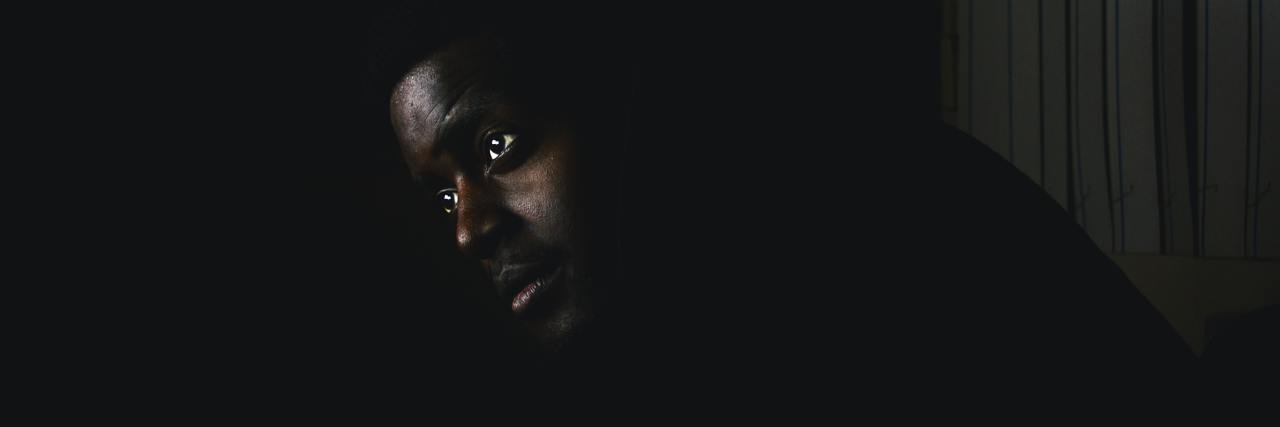Being Black and Mentally Ill Shouldn't Be a Death Sentence
Editor's Note
If you struggle with self-harm or experience suicidal thoughts, the following post could be potentially triggering. You can contact the Crisis Text Line by texting “START” to 741741. For a list of ways to cope with self-harm urges, visit this resource.
My phone rang as I was settling in for the night. I reluctantly answered. The voice on the other end sounded raspy, unsure. It was a loved one asking for help from miles across the country. They were feeling unstable and had intentionally harmed themselves earlier in the day. Due to the lack of financial resources and no access to an adequate mental health service provider, our only recourse was to dial 911. But, I didn’t want them to make the call. Vignettes of Black people slain by law enforcement flashed hot across my mind.
It was hard to breathe.
My most staggering qualm related to the police killing of Daniel Prude: the 41-year-old Black man who died from asphyxiation in Rochester, New York, earlier this March. Recent body camera footage surfaced this week showing police placing a hood — called a spit sock — over Daniel’s head to prevent him from spitting on them, and then shoving Daniel’s head into the pavement while Daniel remained handcuffed and naked. Soon, Daniel stopped breathing and was rushed to the hospital. He died seven days later.
Daniel’s brother, Joe, who called the police, shared a similar dissonance. He scrambled for options to support someone for which he cared deeply, while hoping his choice wouldn’t end in tragedy. Someone in the middle of a mental maelstrom, exposed to the world, and who eventually is met with indifference instead of empathy. The police’s response was inappropriate and damming. Footage shows them laughing at Prude, handling him like a rabid animal, only to press upon his skull while he lay suffocating on the cold wet road. Daniel had experienced suicidal thoughts not too long before, but that night he manifested mania and psychosis. He had reportedly broken windows. Truly, it could have been anything; Black people have been killed for less (see: Breonna Taylor).
Being mentally ill and Black shouldn’t be a death sentence.
Fortunately, my loved one received the care they needed from local police and EMTs. Daniel Prude, however, never returned to his family. According to a CBS News article, the grief and suffering of Daniel’s daughter, Tashyra, was evident on a recent conference call: “I’m still waiting on him to call me and say, ‘I’m coming home’. To know that I will never get that is breaking my heart.” As a father, I felt these words while thinking of my Black child. A year ago, I was stopped by a police officer in Baltimore. Nothing came of it — they did a warrant search and insinuated that my car was stolen — but I left, physically unscathed. Driving home, my hands shook, realizing I could have easily become the subject of another viral video, leaving a dad-sized hole in the heart of my child.
In addition to video footage chronicling police brutality, we’re becoming increasingly privy to the historical and documented mistreatment of Black bodies by medical professionals. From unethical research done on Henrietta Lacks and the Tuskegee Airmen, to the horrendous treatment of enslaved Black women by 19th-century gynecologist J. Marion Sims, there’s little surprise at the collective distrust. Black people are constantly reminded of our disposability. There’s no surprise to the dissonance I felt when discerning whether or not to call 911 for a quick response to my family member in need — a family member whose lack of access to adequate health care isn’t unique.
Due to the economic disparities often directly linked to systemic and environmental racism, there are large numbers of Black Americans without sufficient access to mental health and medical services. The Kaiser Family Foundation states 11.5% of Black Americans were living without health insurance in 2018. Out-of-pocket costs are astronomical, and individuals living at or below the poverty line have to make tough and unnecessary decisions: “Do I tough this out and sleep it off? Or do I add to already climbing debt?”
As someone with excellent health insurance, I still struggle to identify therapists and medical practitioners who have a culturally competent approach. Sometimes it feels to be Black and mentally ill is a probation sentence. Everything is fine until I make a mistake, miss too many doses, or lose my job and it’s benefits. All this, exacerbated by the looming and very real consequences and uncertainty of living in the time of the coronavirus (COVID-19) pandemic.
I’m not alone in the trauma I carry, the diagnosis I live with. The Substance Abuse and Mental Health Services Administration states: “16% (4.8 million) of Black and African American people reported having a mental illness, and 22.4 percent of those (1.1 million people) reported a serious mental illness over the past year.” Furthermore, at only 13.4 % of the U.S. population, “1 in 5 Black people lived in poverty” the same year.
There’s work to be done. There’s healing to be had. And if making a call for help can lead to an early grave, what can we say for how much we care about the Black people living in America? How will we take action to hold our local law enforcement accountable? In what ways can we impact policy that allows for more equitable access to health care, something all of us need? These are questions we need to continue to take seriously, protest or no protest.
For more on the Black Lives Matter movement, see these articles from The Mighty community.
Photo by Rui Silvestre on Unsplash

